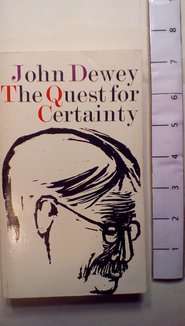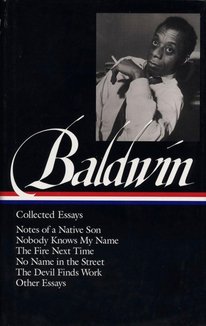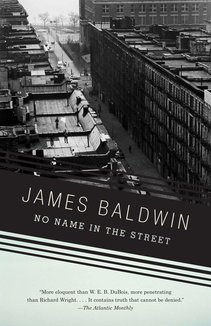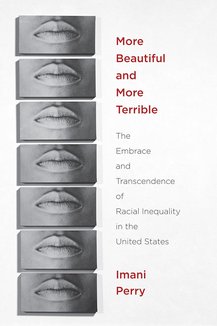Recommended Books

The Quest for Certainty: A Study of the Relation of Knowledge and Action (Gifford Lectures 1929)
Author:
John Dewey
ISBN 13:
978-0399501913
1929. The Gifford Lectures. Contents: Escape from Peril; Philosophy's Search for the Immutable; Conflict of Authorities; The Art of Acceptance and the Art of Control; Ideas at Work; The Play of Ideas; The Seat of Intellectual Authority; The Naturalization of Intelligence; The Supremacy of Method; The Construction of Good; and The Copernican Revolution. See other titles by this author available from Kessinger Publishing.

James Baldwin : Collected Essays : Notes of a Native Son / Nobody Knows My Name / The Fire Next Time / No Name in the Street / The Devil Finds Work / Other Essays (Library of America)
Authors:
Toni Morrison
,
James Baldwin
ISBN 13:
978-1883011529
Toni Morrison's definitive edition of James Baldwin's incomparable nonfiction. Contains all the major essays collections in their entirety, plus 36 uncollected essays. James Baldwin was a uniquely prophetic voice in American letters. His brilliant and provocative essays made him the literary voice of the Civil Rights Era, and they continue to speak with powerful urgency to us today, whether in the swirling debate over the Black Lives Matter movement or in the words of Raoul Peck's documentary "I Am Not Your Negro." Edited by Nobel laureate Toni Morrison, the Library of America's Collected Essays is the most comprehensive gathering of Baldwin's nonfiction ever published. With burning passion and jabbing, epigrammatic wit, Baldwin fearlessly articulated issues of race and democracy and American identity in such famous essays as "The Harlem Ghetto," "Everybody's Protest Novel," "Many Thousands Gone," and "Stranger in the Village." Here are the complete texts of his early landmark collections, Notes of a Native Son (1955) and Nobody Knows My Name (1961), which established him as an essential intellectual voice of his time, fusing in unique fashion the personal, the literary, and the political. The classic The Fire Next Time (1963), perhaps the most influential of his writings, is his most penetrating analysis of America's racial divide and an impassioned call to "end the racial nightmare...and change the history of the world." The later volumes No Name in the Street (1972) and The Devil Finds Work (1976) chart his continuing response to the social and political turbulence of his era and include his remarkable works of film criticism. A further 36 essays—nine of them previously uncollected—include some of Baldwin's earliest published writings, as well as revealing later insights into the language of Shakespeare, the poetry of Langston Hughes, and the music of Earl Hines. LIBRARY OF AMERICA is an independent nonprofit cultural organization founded in 1979 to preserve our nation’s literary heritage by publishing, and keeping permanently in print, America’s best and most significant writing. The Library of America series includes more than 300 volumes to date, authoritative editions that average 1,000 pages in length, feature cloth covers, sewn bindings, and ribbon markers, and are printed on premium acid-free paper that will last for centuries.

No Name in the Street
Author:
James Baldwin
ISBN 13:
978-0307275929
From one of the most important American writers of the twentieth century—an extraordinary history of the turbulent sixties and early seventies that powerfully speaks to contemporary conversations around racism. “It contains truth that cannot be denied.” — The Atlantic Monthly In this stunningly personal document, James Baldwin remembers in vivid details the Harlem childhood that shaped his early conciousness and the later events that scored his heart with pain—the murders of Martin Luther King and Malcolm X, his sojourns in Europe and in Hollywood, and his retum to the American South to confront a violent America face-to-face.

More Beautiful and More Terrible: The Embrace and Transcendence of Racial Inequality in the United States
Author:
Imani Perry
ISBN 13:
978-0814767375
Perry argues that racism in America has moved into a new phase--post-intentional For a nation that often optimistically claims to be post-racial, we are still mired in the practices of racial inequality that plays out in law, policy, and in our local communities. One of two explanations is often given for this persistent phenomenon: On the one hand, we might be hypocritical―saying one thing, and doing or believing another; on the other, it might have little to do with us individually but rather be inherent to the structure of American society. More Beautiful and More Terrible compels us to think beyond this insufficient dichotomy in order to see how racial inequality is perpetuated. Imani Perry asserts that the U.S. is in a new and distinct phase of racism that is “post-intentional”: neither based on the intentional discrimination of the past, nor drawing upon biological concepts of race. Drawing upon the insights and tools of critical race theory, social policy, law, sociology and cultural studies, she demonstrates how post-intentional racism works and maintains that it cannot be addressed solely through the kinds of structural solutions of the Left or the values arguments of the Right. Rather, the author identifies a place in the middle―a space of “righteous hope”―and articulates a notion of ethics and human agency that will allow us to expand and amplify that hope. To paraphrase James Baldwin, when talking about race, it is both more terrible than most think, but also more beautiful than most can imagine, with limitless and open-ended possibility. Perry leads readers down the path of imagining the possible and points to the way forward.